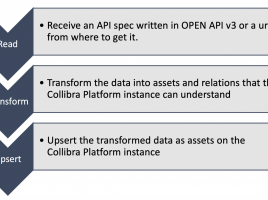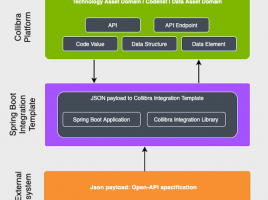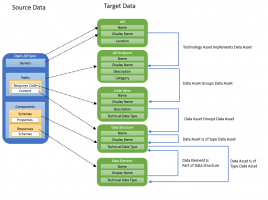OpenAPI Specification (Swagger 3) to Collibra Integration
Overview
The OpenAPI Specification is a format that helps describe, produce, consume, and visualize RESTful APIs. The aim of this integration is to import the API information such as Endpoints, Status Codes, Data Structures, and Data Elements from an Open API Spec. After a successful import, a user is able to see all the data structures related to their data elements and all of the endpoints related to all of their status codes. There are two ways of importing API Specs – either directly using the API Specification JSON file, or using the URL pointing to that JSON file.
Use cases
This Open API specification integration serves the following use cases, amongst others:
-
Oftentimes, a business has a lot of APIs without having control over what each API does or the relations contained in it. This Open API integration will help give a structured view of all of the APIs and lets the user trace which API Endpoint the Data Structures and Data Elements are related to.
-
In this way, each Collibra user is able to understand all the roles and use cases of all of the APIs via the relation views and attributes. They are also able to keep track of the changes in the APIs.
Elements in Scope
From the received API specification, the application extracts the following fields:
- API name and Description
- List of Server Location URLs
- API Tags
- All API endpoints
- Response codes for each endpoint
- Types of responses for each response code.
- List of all components schemas and component response schemas.
To receive support on this item, you can engage our Professional Services team or post any questions in the Data Citizens Community.
Media
More details
Release Notes
- Bugfix in the /sync/url endpoint
Compatibility
- Spring Boot Framework
- Eclipse IDE
- Collibra Data Intelligence Cloud
- Collibra Data Intelligence On-Prem
Dependency
- Java Runtime 17
- Spring Boot Integration Library
- Collibra Data Intelligence Cloud API v2
License and Usage Requirements
Release History
Release Notes
- Upgraded to Spring Boot 3.0.0 and Java 17+
- Functionality to use a local file to trigger the integration
- Separation of /url and /spec endpoint
- Major code refactoring
- Support for anyof, allOf, and oneOf keywords
Compatibility
- Spring Boot Framework
- Eclipse IDE
- Collibra Data Intelligence Cloud
- Collibra Data Intelligence On-Prem
Dependency
- Java Runtime 17
- Spring Boot Integration Library
- Collibra Data Intelligence Cloud API v2
License and Usage Requirements
Release Notes
- Removed security vulnerabilities
- Upgraded to Spring Boot version 2.7.5
- Docker file added
Compatibility
- Spring Boot Framework
- Eclipse IDE
- Collibra Data Intelligence Cloud
- Collibra Data Intelligence On-Prem
Dependency
- Java Runtime Environment 1.8
- Spring Boot Integration Library
- Collibra Data Intelligence Cloud API v2
License and Usage Requirements
Release Notes
-
Support to */* media-type
Compatibility
- Spring Boot Framework
- Eclipse IDE
- Collibra Data Intelligence Cloud
- Collibra Data Intelligence On-Prem
Dependency
- Java Runtime Environment 1.8
- Spring Boot Integration Library
- Collibra Data Intelligence Cloud API v2
License and Usage Requirements
Release Notes
Changed:
- Updated Integration Library to version 1.1.7
- License year
- Code refactoring
- Updated CMA file
Added:
- Ability to scan for data structures using a JSON example
- New relation for unused data structures
- Additional utility file for validation and tools
Compatibility
- Spring Boot Framework
- Eclipse IDE
- Collibra Data Intelligence Cloud
- Collibra Data Intelligence On-Prem
Dependency
- Java Runtime Environment 1.8
- Spring Boot Integration Library
- Collibra Data Intelligence Cloud API v2
License and Usage Requirements
Release Notes
- Updated the Spring Boot Starter Parent version to 2.5.12
- Updated the Collibra Integration Library version to 1.1.5
Compatibility
- Spring Boot Framework
- Eclipse IDE
- Collibra Data Intelligence Cloud
- Collibra Data Intelligence On-Prem
Dependency
- Java Runtime Environment 1.8
- Spring Boot Integration Library
- Collibra Data Intelligence Cloud API v2
License and Usage Requirements
Release Notes
- Refactoring according to standard-reference template
- File Structuring of Components and Services
- Constructor Autowiring
- Adding Constants
- Fixing Type Warnings
- Exception Handling
- Lombok
- Sync Lock
- Adding AppConfig
- Updating Authentication Config
- Added CMA file
- Main Service with ETL format
Compatibility
- Spring Boot Framework
- Eclipse IDE
- Collibra Data Intelligence Cloud
- Collibra Data Intelligence On-Prem
Dependency
- Java Runtime Environment 1.8
- Collibra Data Intelligence Cloud API v2
- Spring Boot Integration Library
License and Usage Requirements
Release Notes
Initial release:
Spring Boot integration that receives an JSON payload containing an Open-API specification or a URL from where to read it, transforms it, and the upserts it to a Collibra environment as assets.
Compatibility
- Spring Boot Framework
- Eclipse IDE
- Collibra Data Intelligence Cloud
Dependency
- Java Runtime Environment 8
- Collibra Data Intelligence Cloud API v2
- Collibra Platform v2021+
- Spring Boot Integration Library
License and Usage Requirements
See existing Q&A in the Collibra Community
Browse discussions with customers who also use this app.
Start a New Topic in the Collibra Community
Collibra-hosted discussions will connect you to other customers who use this app.
The following terms shall apply to the extent you receive the source code to this offering: Notwithstanding the terms of the Binary Code License Agreement under which this integration template is licensed, Collibra grants you, the Licensee, the right to access the source code to the integrated template in order to copy and modify said source code for Licensee’s internal use purposes and solely for the purpose of developing connections and/or integrations with Collibra products and services.
Solely with respect to this integration template, the term “Software,” as defined under the Binary Code License Agreement, shall include the source code version thereof. Except with respect to the foregoing, all remaining terms of the Binary Code License Agreement shall apply to the license of integration template hereunder.





